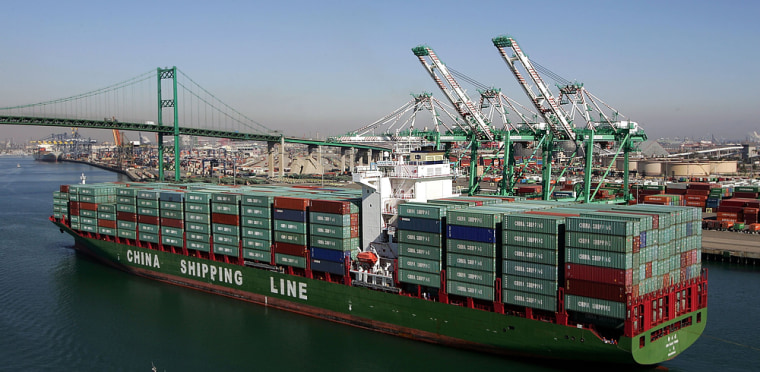Cargo industry officials are worried that a federal ID system aimed at boosting security could cost many port workers their jobs, something that would bottle up the flow of goods destined for virtually every U.S. community.
Details of the program — more than three years in the making — are still being worked out. But according to industry officials who have discussed it with the Transportation Security Administration and Coast Guard, illegal immigrants and people convicted of certain crimes might be barred from the positions they now hold.
At ports, that could mean thousands of people will be out of jobs, including dock workers and truck drivers.
“Of course there are concerns,” said Chuck Carroll, executive director of the National Association of Waterfront Employers, a trade group for terminal operators. “You’d have the same number of boxes but fewer people to move them, and that could mean major congestion.”
Steve Stallone, spokesman for the International Longshore and Warehouse Union, said a conviction shouldn’t automatically preclude someone from working.
“Just because a guy got into a bar fight does not make him a terrorist,” said Stallone, whose union represents nearly 14,000 West Coast longshoremen and clerks. “Terrorist acts are one thing. But that you beat up your next-door neighbor? I don’t think so.”
Up to 6 million people could be impacted
The issue in question is the Transportation Worker Identification Credential program, a post-Sept. 11 security measure that seeks to better control access to harbors, rail yards, airports and other cargo transit areas terrorists might target. It could affect as many as 6 million people.
TSA and Coast Guard officials have refused to discuss details of the plan before it is unveiled, which could be as early as next week.
“We are the first to admit that we need to finish the job,” the agency said in a statement. “This is an initiative that has languished for too long.”
Since the Sept. 11 attacks the federal government has spent many billions of dollars increasing airport security but less has been done at ports. Only a small percentage of cargo is inspected and many workers undergo little or no scrutiny for possible criminal records.
Port security is a sensitive area. Earlier this year, the Bush administration was forced to scrap plans to allow a Dubai-based company to assume oversight at major U.S. harbors after critics in both major political parties voiced strong opposition.
“The openness of our ports ... is one of the tremendous marks of success in this global economy, but it also provides an opportunity for terror,” said Rep. Dan Lungren, R-Calif., who is sponsoring port security legislation with Rep. Jane Harman, D-Calif. “We ought to limit (access) to people who are here legally. We ought to limit it to people who would not jeopardize that security.”
2002 law relies on biometrics
A federal maritime security law passed in 2002 mandated a worker credential that relies on “biometrics” — fingerprints and other distinguishing characteristics — and background checks. The ID system has undergone testing at sites in California, Florida, New Jersey, New York, Pennsylvania and Delaware.
The TSA proposal is expected to include rules similar to those for truck drivers who ferry hazardous materials, according to Carroll; Lisa Himber, who serves on a federal advisory board for maritime security; and Mike Mitre, the longshoremen union’s port security director. They are among industry officials who have discussed the plan with government authorities and confirmed details of the proposal.
The proposal would bar anyone who is on a terror watch list, entered the country illegally or has certain criminal convictions. Among the disqualifying crimes would be offenses related to espionage, terrorism, explosives or “a transportation security incident.” In some cases, workers could be excluded for assault with intent to murder, kidnapping, rape, drug offenses, extortion, robbery and fraud.
It’s unclear exactly how many workers fall into those categories, though it’s generally acknowledged that illegal immigrants and felons work at the ports.
Last week, seven of 50 truckers checked by immigration authorities outside the Los Angeles-Long Beach port complex were arrested on suspicion of being in the country illegally, according to U.S. Immigration and Customs Enforcement.
Florida requires background check
And in Florida, one of the few places where port workers already must submit to extensive criminal background checks, hundreds have been rejected for jobs since early 2001 because of criminal pasts, said Nevin Smith of the Florida Department of Law Enforcement.
Any significant loss of workers could cause big problems at the twin ports of Los Angeles and Long Beach. With about 43 percent of America’s goods passing across their docks, the adjacent ports make up the nation’s largest such complex. The ports were so chronically jammed in 2004 that they expanded their hours to nights and weekends the following year.
A nationwide trucker shortage could compound matters. At the Southern California complex, any undocumented immigrants are thought to work largely as truckers, not longshoremen.
Art Merrick, president of the Long Beach Container Terminal, said the port might be able to absorb a 10 percent reduction in truck drivers.
“What if it’s more?” he asked. “You start thinking about the what-ifs.”
